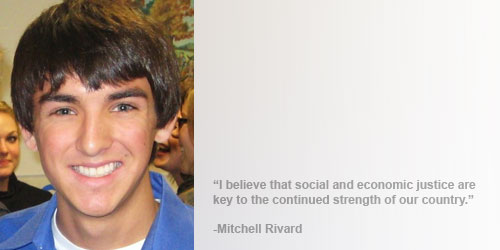by Jessica Carreras

Mitchell Rivard is a college student at Michigan State University. He's also an ardent activist for such causes as getting out the vote, social and economic justice and blood donor discrimination. After finishing school, Rivard hopes to become a lawyer.
1 How did you first become interested in politics and activism?
I first became interested in politics and political activism my senior year of high school, where I initiated a countywide voter registration program to register 18 – 24 year olds to vote in my home county of Bay County.
After job shadowing our county clerk for a day, I was not satisfied with the all-time low voter registration amongst youth, so I started by taking stacks of voter registration forms to my high school to register my friends. Over a two month period, I turned my presentations into a massive countywide effort that increased voter registration amongst 18 – 24 year olds by 17 percent.
2 What political or LGBT issues are most important to you now?
I believe that social and economic justice are key to the continued strength of our country. We must make sure that every individual has the chance to succeed, and that includes both social and economic justice for all individuals, no matter what your age, race, sex, religion, sexual orientation or any other classification.
Economically, it is an all-too-common reality today that the rich are getting richer and the poor are getting poorer, and I believe that the middle class is vanishing.
Socially, there are some in our country who are working around the clock to make sure that others don't have the same equal rights that they enjoy. This includes LGBT issues, obviously including the right to marry the one that you love, but also a wide variety of economic issues, including legal and economic benefits protected by marriage. Our country was built on the founding belief of equality and that all men are created equal, but I don't believe that we are currently adhering to that as a nation.
3 What do you hope to do after college?
After my undergraduate studies at Michigan State University, I hope to go to law school and then enter into some type of public service, whether that be related to the judicial system as a public defender or through elected office.
4 What's your 2010 "gay agenda" for Michigan?
Honestly, I don't believe that we should have a "gay" agenda, just as I would hope that heterosexual people don't have a "straight" agenda.
While I am a gay male and I certainly believe in rights for all who are LGBT, I believe that defining a particular "gay" agenda could inhibit progress toward equality. I believe that the LGBT community needs to stand up for our rights and demand them until we get them, but we must understand that anger, hate, resentment and bitterness will only hurt our cause. We should not simply let our frustrations turn into anger, but continue down the path of progress toward true equality; it may take some time, but the truth has always prevailed throughout history.
5 You're also involved in the issue of blood donor discrimination – tell me about your work with that.
Under current blood donation laws, no male is able to donate blood if he has engaged in sexual activity with any other male since 1977. At the same time, however, any heterosexual man or woman – even one who has engaged in sex with an HIV-positive partner – is able to donate only one year after the encounter. The discrimination is targeted specifically at homosexual men – even homosexual women do not have the same restrictions.
This is clearly an outdated policy that is blatantly discriminatory towards gay men. Unfortunately, most people – including people of the LGBT community – do not know about these existing policies.
It is easy to understand the reasoning behind the FDA's implementation of the rules in the early 1980s when society's understanding of HIV and AIDS was much more limited. But 25 years later, when knowledge has advanced so rapidly, these rules stem more from reactionary prejudices than scientific reasoning.
In a time when the Red Cross is underscoring its urgent need for donation, it seems not only bigoted, but also dangerous to public welfare, to turn away so many thousands of donors. The FDA should create more detailed questionnaires about potential donors' sexual history, instead of fostering implicit assumptions about gay individuals. Personal history is the pertinent information; blind predetermination based on orientation is not.
To learn more about blood donor discrimination, visit http://www.endblooddonordiscrimination.com.










